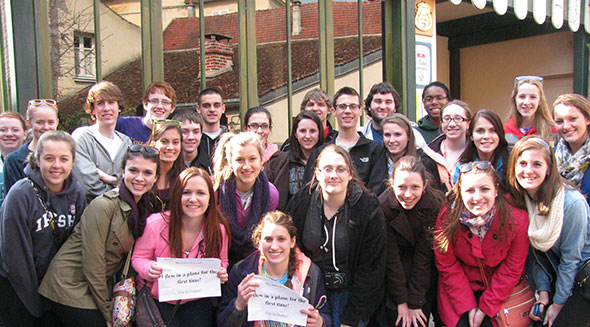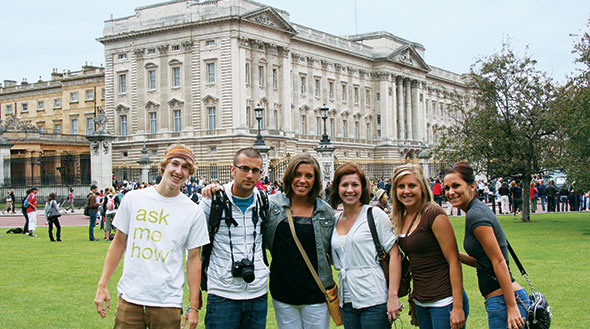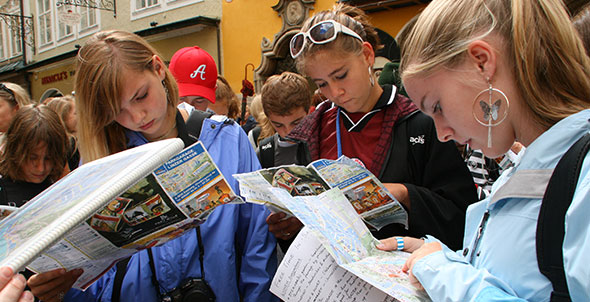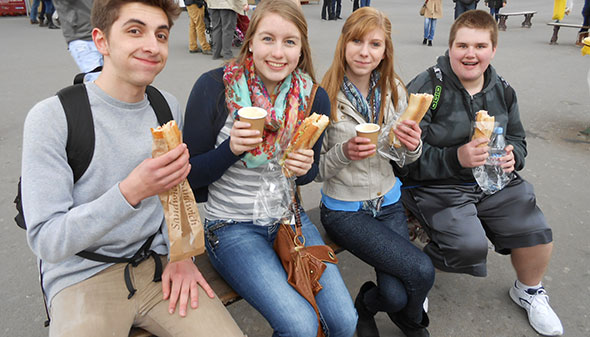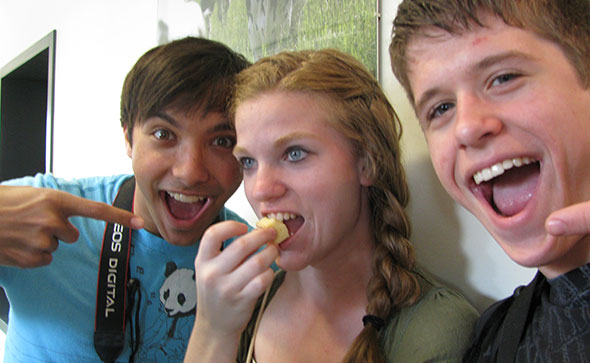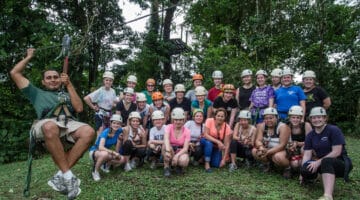25 Tips for Getting the Most Out of Your Student Tour Arrival Day
Arrival day can be tough. You’ve been eagerly anticipating your trip for months, with expectations building and excitement growing. It all culminates with a bleary-eyed touchdown in a foreign city after many hours of transit, and few hours of sleep, without much time to regroup as you hit the ground running. After all, you want to get the most out of your time abroad!
ACIS Tour Managers have witnessed countless parades of sleepy travelers exiting the airport arrivals area. Over many groups and many years, they’ve learned what works best so teachers and their students can take full advantage of that first day on tour. They are eager to share their tips for minimizing jet-lag, adjusting to a new culture and setting a tone of excitement (not exhaustion) for the rest of your travels.
Straight from the source, here are our tour managers’ top 25 suggestions for maximizing your arrival day:
On Pre-departure Planning and Packing
1. “Read a story or article about the destination, listen to some music or watch a film (perhaps even in the target language), to ease the transition between cultures.” – Daniel Finch-Race
2. “It is easier said than done to sleep on the plane. Everyone is excited, there isn’t much space and an upright seat isn’t terribly comfortable. You can however make sure you get a very good night’s sleep the day before your departure from the US. That sound obvious, but to prepare for a 30 hour stretch with little or no sleep, you want to be fully rested beforehand. If you can grab a couple of hours sleep on the plane, all the better.” – Peter Ede
3. “Try to make your group understand that it is clever and cool to travel light. Only retirees travel with enormous suitcases! If they’d like to learn how to travel, be independent, and get valuable skills for college trips (and future solo backpacking trips in Europe?), they need to nail this skill. And remember that you need space in your bag to bring souvenirs back. Travelling light makes a trip so, so much easier. It’s easy to move hotels, easy to get on and off the bus and easy to share a room.” – Sarah Perry
4. “Never assume your checked luggage will arrive on time. 99 times out of 100 the group’s baggage comes through without a delay, but make sure that you don’t pack anything essential in your hold luggage so that the airline’s mistake does not cause you a real problem whilst the bag is located. Put essential items, like medication and your camera in your carry-on instead. And do not assume you will be able to access your hold luggage until late on arrival day when you check into your hotel. It is amazing how many people have to dig round in their suitcases on the sidewalk for items such as umbrellas, anoraks or long pants, which could easily be in their carry-on luggage instead.” – Peter Ede
5. “Take a spare shirt/top/t-shirt in your hand luggage so that you can change when you arrive at the airport or at the hotel. It will help you to feel fresher.” – Prue Richardson
6. “Bring a pack for the day ready to hit the ground running, especially with direct flights.” – Espin Bowder
On Timing
7. “Hotel rooms are not ready until 2pm, 3pm or sometimes even later. Have the full expectation that you won’t be checking in until the late afternoon, rather than hoping your room will be ready earlier. In all likelihood you will transfer to the hotel, store your bags there, and then go out exploring. You can ease this process by not putting items in your suitcases that will need to access, and having the mindset that this is what will happen and it would be best to make the most of it.” – Peter Ede
8. “Accept that jet lag exists! If you know it’s going to happen and that you’ll spend a day feeling a bit odd, then it’s much less awful when it happens. Explain this to the group and pass on the idea that it’s another fun(!), adventurous part of travel that should be accepted with humour. Ideally, stay out all day and only return to the hotel an hour before dinner. And please, please NEVER plan to do anything after dinner on arrivals day. Even if you or the group feel like it at the time, you’ll feel awful the next day if you don’t get a big night of sleep.” – Sarah Perry
9. “It is really helpful for you to try to forget what time it is back home. You have to switch your watch, your iPhone and anything else to local time and just concentrate on that. The more you think, “it’s 6am back home and I still haven’t slept” (or even discuss this with friends) the worse you will feel.” – Peter Ede
10. “Call it a day after dinner…The kids will be asleep in their soup and the other adults will want to kill you if you want to go out all night!” – Sonia Beck
On Sightseeing
11. “When choosing what activities to do, or sites to visit on your arrival day try to avoid things which you will find emotionally draining, such as a battleground or concentration camp. Instead aim to visit something uplifting (and outdoors if the weather’s nice) as this will help lift your mood and make you feel excited about the rest of your trip. It’s good to choose places are iconic and that you’ve been looking forward to seeing for a long time, like the Duomo in Florence, the Colosseum in Rome, the Eiffel Tower, or Buckingham Palace. This way you feel as though you have achieved something tangible on your arrival day, and that it was not just a write-off from being tired.” – Prue Richardson
12. “Don’t be over ambitious!! One good sightseeing trip on arrival is great – anything else is a bonus. Too many groups/assistants get grumpy over being frog-marched around with jet lag! And be flexible. If the plane is 3 hours late you probably can’t do everything you’d thought about.” – Sonia Beck
On Logistics
13. “Familiarise yourself with the area around your hotel and make sure you know its name. Your Tour Manager will have a lot to tell you and it’s hard to remember everything when you’re tired. Try to listen carefully and ask questions – be sure you know when and where to meet next.” –Stan Pretty
14. “Do be really security conscious on the first day. Check that kids have passports and money secured safely somewhere and are carrying hotel cards and GL phone numbers. Nothing worse than it all going pear-shaped in those first hours.” – Sonia Beck
15. “Prepare in advance how you are going to count your group. This is vital to the smooth running of the tour. Group leaders and tour managers can have different preferences for how they like to do this, but it is difficult to make a decision about it on arrival day, as you will be tired.” – Prue Richardson
16. “It’s important to nail the boring stuff like money changing, phone calls and food on the first afternoon and not to try to dash off unprepared.” – Sonia Beck
On Food and Drink
17. “Drink lots of water, both on the plane and after landing; dehydration will only augment disorientation and feelings of ‘giddiness’ due to being tired.” – Daniel Finch-Race
18. “Jump in! On day one, take the group out and eat something local. Make a thing of it. Go to a patisserie in France and pick a beautiful cake each. Or stop at a cheese shop (or ham shop in Madrid?), buy something unusual and get everyone to try it. Or go to the fridge and pick a soda or can of drink that you’ve never seen before. If trying new things is made fun and interesting from day one, you’ll see the students every day doing the same themselves. They’ll come back from their free time with packaging, photos and stories to tell you about the things they’ve bought or ordered, and you will have put this spirit of discovery into their minds.” – Sarah Perry
19. “Eat small amounts of food regularly rather than one heavy meal to keep yourself feeling energised and alert before you go to sleep again. One heavy meal can leave you exhausted as you try to digest it all.” – Prue Richardson
On Group Dynamics
20. “You may be travelling with other groups on the coach. You will naturally want to sit with your own friends and familiar faces on the first couple of days, but a friendly smile and introduction to your fellow travelers on Arrival Day will make getting to know them much easier as the trip progresses. I have known lasting friendships to develop between people from different parts of the US on trips, and this is an absolute added bonus as I see it. You are not only experiencing different cultures and people outside the coach, but you are getting to know fellow Americans who may be from a very different part of the States. Enjoy this experience.” – Peter Ede
21. “Read other group leaders carefully. It is understandable that you should wish to get to know other groups travelling with you on the bus, but make sure that you listen to them and read their body language. They may be keen to get to know you, but suffering from a headache or anxiety and need some time until they feel more comfortable.” – Prue Richardson
On Attitude
22. “The group leader’s job is to get the group excited about the trip and everything they will see and experience. But please don’t do this at the expense of the reality of travel. There will be difficulties be it jetlag, food, homesickness or just simply waking up one morning in a bad mood. If you get the group to anticipate these feelings or events and talk through them before departure, it isn’t a shock or so difficult to cope with when it happens. The group needs to be able to take a difficult or testing situation and laugh about it. In the words of my brother: “Every sh*t situation is one week away from being a great anecdote!”” – Sarah Perry
23. “Verbalise the differences you are seeing between the place you have arrived and home. This not only helps you to acclimatise to your new city, but informs the tour manager, and any other groups you are travelling with about your hometown and your lifestyle there. And see the positive in the new. It’s great to use words like ‘different’ and ‘exciting’, ‘innovative’, even ‘quirky’, as the group will begin to share your enthusiasm for the new city, and the tour manager and other group leaders will appreciate your openness to new environments and ideas.” – Prue Richardson
24. “The best motto you can have for your travels is that things are different, they are not ‘weird’. Enjoy the differences. Look out for them. If everything were exactly the same as back home, there would be no point travelling. Perhaps the greatest aspect of foreign travel is realizing that the US actually does many things remarkably well. Notice the differences, and celebrate them. Equally, Europe does things great and you can learn from them. You will be back at home in 7, 9 or 14 days. Enjoy the time you are away to reflect on this diversity and you will get far more enjoyment from the trip, rather than missing things from home or branding the local culture as weird.” – Peter Ede
BE FLEXIBLE!
25. In the words of the wise Peter Ede, “The single biggest thing you can do on Arrival Day is to be flexible. It underpins everything. Matters may not go smoothly for all manner of logistical and practical reasons. Keeping a sense of humor, the ability to adapt, and an expectation that things may not be quite how you want or expect them to be will only benefit you. Trust that you’re in safe hands, that this is the most challenging day of the trip, keep the right attitude and a smile on your face, and it will turn out to be the best foundation for a wonderful experience.”
